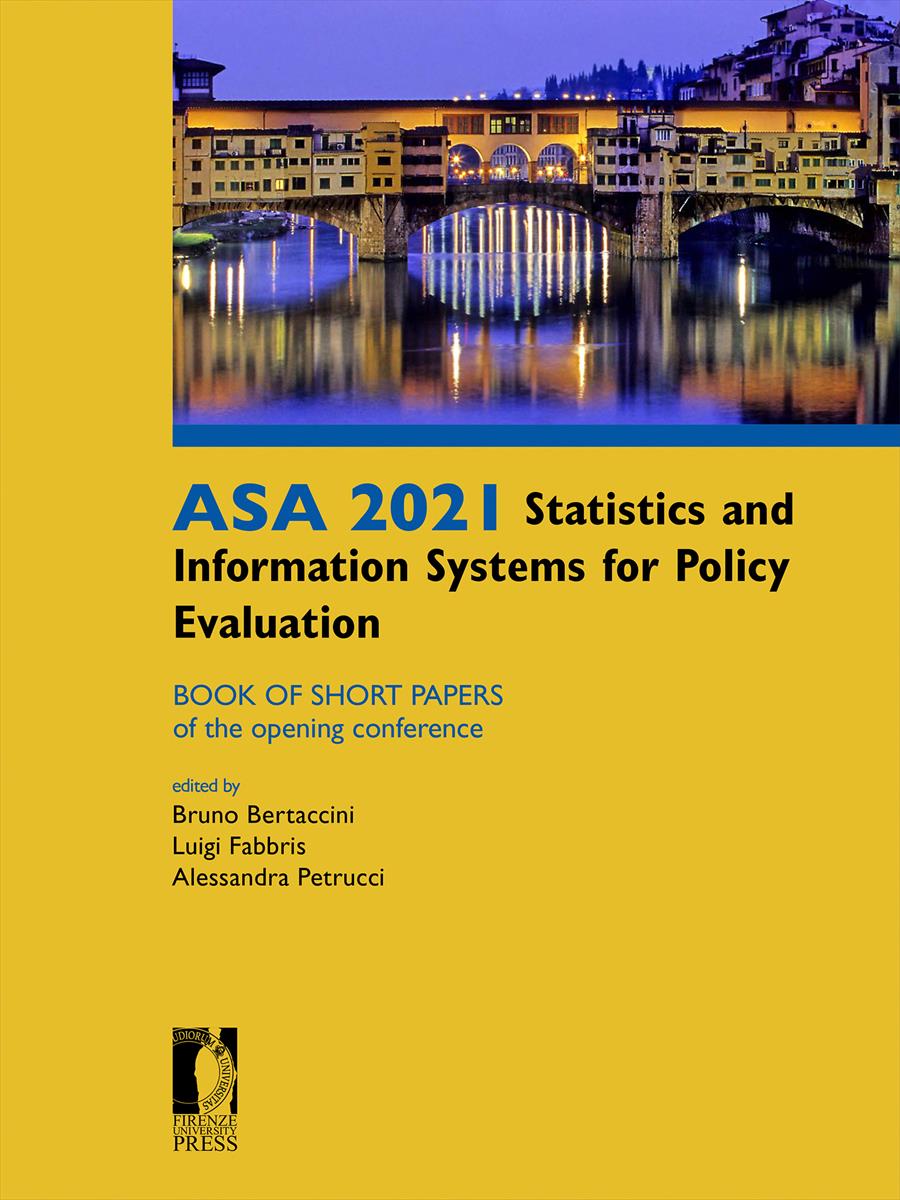- ASA 2021 Statistics and Information Systems for Policy Evaluation
- A cura di Bruno Bertaccini, Luigi Fabbris, Alessandra Petrucci
An analysis of the transaction towards sustainable food consumption practises during the Italian lockdown for SARS-CoV-2: the experience of the Lombardy region
- Marco D’Addario
- Massimo Labra
- Silvia Mari
- Raffaele Matacena
- Mariangela Zenga
- © 2021 Author(s) |
- CC BY 4.0
- DOI: 10.36253/978-88-5518-304-8.24
This paper intends to investigate the behaviours adopted during this lockdown period due to SARS-CoV-2, in which most individuals have found themselves forced to carry out their daily lives within domestic boundaries, and compare them with previously practiced food-related habits. The aim is to understand whether strategies of buying, preparing and consuming food have changed with respect to established habits of 'ordinary' periods, and how these choices are linked to the psychological and emotional wellbeing/feeling experienced by individuals, to the physiological well-being of individuals and to social, environmental and economic sustainability. The analysis is based on the survey carried out by the Department of Psychology in collaboration with the interdepartmental center BEST4Food of Milano-Bicocca university.
- Keywords:
- Food,
- sustainable consumption,
- Lockdown,
- SARS-CoV-2,
University of Milano-Bicocca, Italy - ORCID: 0000-0002-7659-885X
University of Milano-Bicocca, Italy - ORCID: 0000-0003-1065-5804
University of Milano-Bicocca, Italy - ORCID: 0000-0001-6543-5249
University of Milano-Bicocca, Italy - ORCID: 0000-0003-2689-1545
University of Milano-Bicocca, Italy - ORCID: 0000-0002-8112-5627
- Adler, N. E., Epel, E. S., Castellazzo, G., Ickovics, J. R. (2000). Relationship of subjective and objective social status with psychological and physiological functioning: Preliminary data in healthy, White women. Health Psychology, 19(6), pp. 586-592. DOI: 10.1037/0278- 6133.19.6.586
- Galimberti, A., Cena, H., Campone, L., Ferri, E., Dell’Agli, M., Sangiovanni, E., et al. (2020). Rethinking Urban and Food Policies to Improve Citizens Safety After COVID-19 Pandemic. [Perspective].Frontiers in Nutrition, 71(181). DOI: 10.3389/fnut.2020.569542
- Linting, M., & van der Kooij, A. (2012). Nonlinear Principal Components Analy- sis With CATPCA: A Tutorial. Journal of Personality Assessment, 94(1), pp. 12-25. DOI: 10.1080/00223891.2011.627965
- Willett, W., Rockstro, J., Loken, B., Springmann, M., Lang, T., Vermeulen, S., et al. (2019). Food in the Anthropocene: the EAT-Lancet Commission on healthy diets from sustainable food systems. The Lancet, 393(10170), pp. 447-492. DOI: 10.1016/S0140-6736(18)31788-4
Informazioni sul capitolo
Titolo del capitolo
An analysis of the transaction towards sustainable food consumption practises during the Italian lockdown for SARS-CoV-2: the experience of the Lombardy region
Autori
Marco D’Addario, Massimo Labra, Silvia Mari, Raffaele Matacena, Mariangela Zenga
Lingua
English
DOI
10.36253/978-88-5518-304-8.24
Opera sottoposta a peer review
Anno di pubblicazione
2021
Copyright
© 2021 Author(s)
Licenza d'uso
Licenza dei metadati
Informazioni bibliografiche
Titolo del libro
ASA 2021 Statistics and Information Systems for Policy Evaluation
Sottotitolo del libro
Book of short papers of the opening conference
Curatori
Bruno Bertaccini, Luigi Fabbris, Alessandra Petrucci
Opera sottoposta a peer review
Anno di pubblicazione
2021
Copyright
© 2021 Author(s)
Licenza d'uso
Licenza dei metadati
Editore
Firenze University Press
DOI
10.36253/978-88-5518-304-8
eISBN (pdf)
978-88-5518-304-8
eISBN (xml)
978-88-5518-305-5
Collana
Proceedings e report
ISSN della collana
2704-601X
e-ISSN della collana
2704-5846
